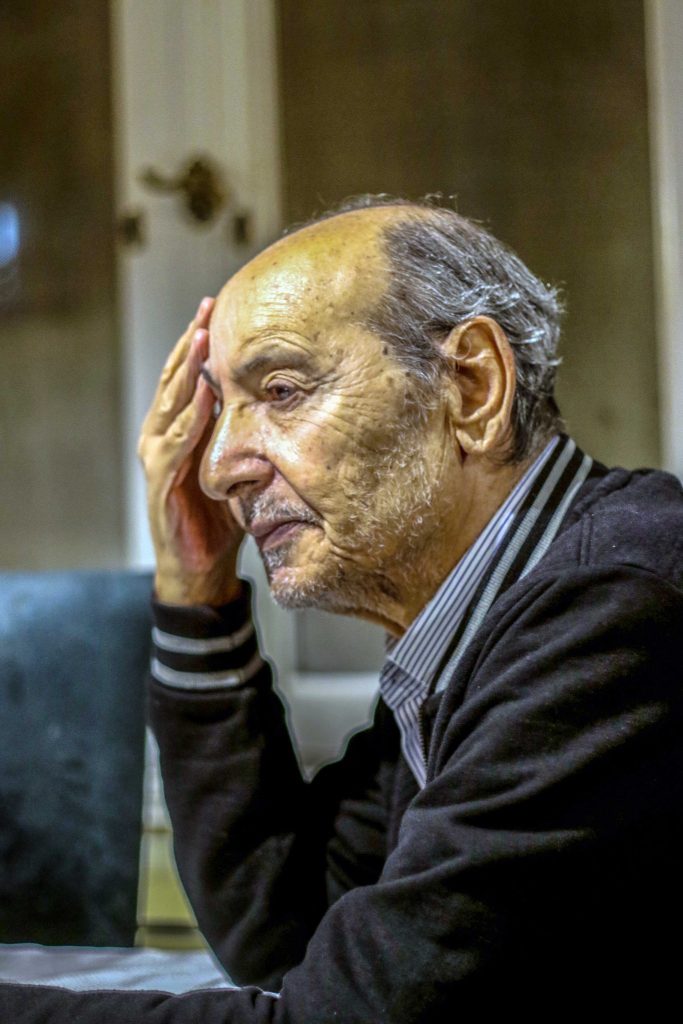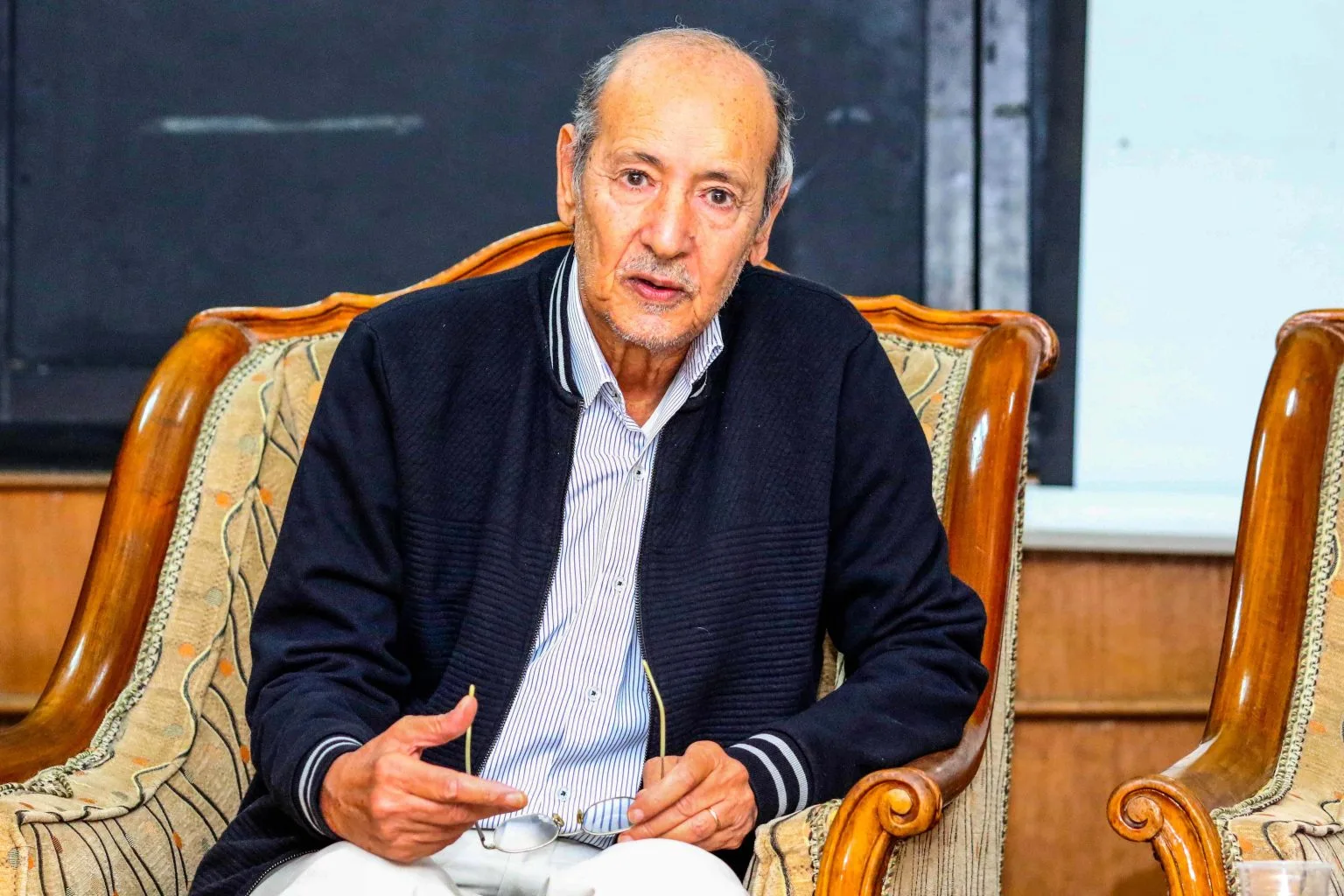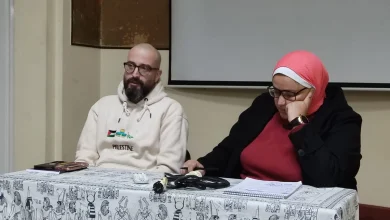Novelist and short story writer Abdel Hamid Al-Basyouni sits on the balcony of his house overlooking a small garden, the edges of which have been turned into parking spaces, waiting for a meeting that was supposed to take place at a nearby café where he usually sits in the evening. However, he preferred to be on his balcony, enjoying the breeze that cooled the summer night.
In a corner next to the balcony, al-Basiony has set up a library for his reading, and next to it is a corner with copies of his five publications, which he gives to his friends as gifts. He pulled out several copies and began sorting through them before saying: “I don’t consider myself a professional; I am an amateur and an amateur writer. I don’t have a daily reading and writing routine. When an idea comes to me, I don’t write it down quickly. Instead, I let it ferment slowly for a week, or even a month or more, until it is complete before I start writing. For me, literary work is like childbirth. A fetus develops and slowly matures until it is ready.
He adds with a smile: “I am 70 years old and have produced three collections of short stories, a novel, and a critical book. My output may not be prolific, but it expresses who I am and how I have been influenced by the cities I have lived in and the people I have met.” I believe that any genuine writing must resonate with the discerning reader, even if only after a while.
The dilemma of the writer and the soccer player
When searching for the name of the writer Abdel Hamid Al-Basyouni on search engines, results may appear for a former soccer player and current coach with the same name, who is more famous. In today’s world, having a similar name can be a real problem, especially if you are a writer trying to make a name for yourself in the literary world, while a soccer player who fills the stadiums with noise shares your name. This is the dilemma faced by short story writer and novelist Abdel Hamid Al-Basyouni.
During his career, Al-Basyouni has published: a collection of short stories entitled Voices in the Night, published by Dar Al-Thaqafa Al-Jadida in 1979; Small Mistakes, a collection of short stories published in 1995 by the General Book Authority; He also published Several Reasons for Cruelty in 1997 through Adab Al-Jamaheer. In 2007, he published a critical book titled The Short Story and Novel in Ismailia Between Soccer and Mango Fruit. He recently published his first novel, To Be in Negril, in 2015 through Al-Ahram Publishing Center.
He justifies his lack of output and the long periods between his works by saying that his adolescence and pre-university studies were a period of writing poetry. His literary vision began to take shape at university, when he met students from the political left who shaped his new consciousness after he moved from his simple rural life in Aga to Cairo, where he studied at the Faculty of Commerce at Cairo University.

How does a writer distance himself from writing?
El-Basyouni considers his trip to Iraq for work to have been his longest break from writing. He traveled there in 1979 and remained until 1984 without writing. The reason was the advice of an Egyptian writer he met there, who warned him not to identify himself as a writer or novelist or to associate himself with culture or politics.
He says: “Political relations between Egypt and Arab countries were tense after Sadat’s visit to the Knesset. I didn’t write there, I just read. I was working in a province in southern Iraq on the recommendation of a delegation from the Iraqi Ministry of Industry in a job interview in Cairo. It seems they realized my leftist leanings before I left.”
Before resuming writing
Al-Basyouni considers this to have been his longest break from writing. Even after returning to Egypt and moving to Ismailia following his employment with a Suez Canal Authority, it took him a long time, he says, to get used to the city and be influenced by it before continuing to write.
“I didn’t write about my time in Iraq, although some aspects of it appeared later. But the countryside and my memories of birth and childhood appeared in my fictional characters. Because place influences the writer. Writing is essentially an aesthetic formation of reality, and place is its raw material.”
He adds: “Dealing with the political left makes the writer see reality differently. Because his vision stems from his understanding of the world and the laws that govern it.” Therefore, his influence by the left played a major role in his interest in writing about people’s problems and small cities such as Ismailia. This is reflected in his first novel, To Be in Negril.
The first novel
Writing “To Be in Negril” took between 1997 and 2015. Al-Basyouni says: “This novel took a long time to mature; I usually write slowly. A month ago, I was on my way back to Ismailia from Alexandria. Something happened in front of me that gave me an idea for a short story, ‘It’s still forming in my mind… before it’s written on paper.’”
He believes that a writer’s fame may depend on various circumstances. He recounts: “While I was searching for my name on search engines in preparation for a television program, I was surprised to find that the results always referred to the name and history of a soccer player and coach with the same name. I kept searching until I found what was written about me.”
He smiles and says, “He is definitely more famous than me, because soccer is more important to the public. Not only in Ismailia, but in all of Egypt. Soccer players are more famous than any writer, and unfortunately, the audience for culture is much smaller than the audience for soccer.”
Writing about cities
Al-Basyouni believes that novels are the offspring of large cities, and since Ismailia is a relatively small city, it has suffered from a lack of writers and authors. The literary community only knew a limited number of names, such as Mahmoud Diab, Fouad Talba, and Mohamed Abdullah Issa.
Because literature plays an important role in embodying the city in substance and spirit, and in preserving its heritage and identity, the writings of the writers of the Canal cities were dominated by the theme of resistance. Colloquial poetry prevailed because of its proximity to the people and its ability to reach them. With few exceptions, it was rare for a story, novel, or classical poet to emerge from these cities.
Al-Basyouni wove the characters of his novel, influenced by his group of friends in Ismailia during the 1990s. He turned them into fictional characters around whom the events of the novel revolved, which dealt with the changes that the city witnessed in the 1980s after the emergence of radical Islamic currents, following Sadat’s unleashing of the Islamic current in the face of leftist movements in the streets and universities of Egypt.
Painting a true picture of Egypt
Al-Basyouni says: “I see art as an aesthetic representation of reality in its movement and transformations towards the future. Through my novel ‘To Be in Negril’, I sought to paint a true picture of Egypt after the October War, when Sadat released the so-called Muslim Brotherhood prisoners onto the streets. At the same time, huge numbers of Egyptians working in the Gulf returned, bringing with them the culture of the desert and a return to the past. Meanwhile, the authorities were preoccupied with the move towards capitalism and economic liberalization. Conditions deteriorated and the culture of society declined. We had to embody this in works of art so that we could explain it to everyone.”
He concludes by adding: “The novel embodies these transformations and points to the need to get rid of them. Most of its characters are taken from the society around us. They are friends in Ismailia with different voices and various models. It also depicts the conflict between backwardness and the desire for progress, a conflict that ends with the suicide of the intellectual character in the novel, Bahgat. He was assaulted by members of the Muslim Brotherhood, which ultimately drove him to suicide. Thus, my message and purpose in the novel is to depict the bitter reality we experienced during the transformation of Egyptian society from a productive society to a consumer society, and the control of brokers and merchants over its joints.





